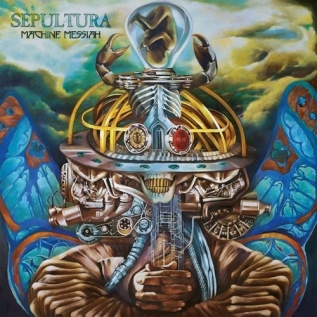Let’s not kid ourselves – SEPULTURA are far from being the band they were in the 90s. Once one of the mightiest and most exciting forces in metal, today they have been reduced to releasing albums no one really has any expectations for. Which is kind of sad. But this is also a moral tale about how uncontrolled pride can make you slide from the top towards the abyss of mediocrity.
But what can a band do to get out of such a situation, though? One option is what SEPULTURA tried with ‘The Mediator Between Head and Hands Must Be the Heart’ (2013) – to seek a way out by turning back to inspirations and collaborations that had worked once in the past. The other possible move is the opposite – to go full steam ahead and hope it works out.
‘Machine Messiah’ sees SEPULTURA try the latter option. This is an album, in which they don’t even make that much of an effort to sound like SEPULTURA. Some musical elements that have been fundamental for the band’s sound are thrown in the trash: the rhythm section that felt like being run over by a herd of buffalos, or the characteristic buzzy down-tuned guitar sound. Instead, you get a prog-like production with a clear high range that highlights the lead-work; impressively fast and precise drumming by Eloy Casagrande; and songs that are easily distinguishable from one another, each armed with a catchy chorus.
In the opening title track, some melodic chords and clean (!) vocals by Derrick Green calmly take their time setting up the stage for a grand chorus, the riff in which is much more Tony Iommi than Andreas Kisser. This is more of a statement of intent to break the mould, rather than a song that sets the tone. The album’s stylistic backbone is defined by songs like ‘Phantom Self,’ ‘Sworn Oath’ and ‘Resistant Parasites.’ On one hand, they successfully intertwine strings and orchestrations with some heavy groove metal.
On the other, Kisser’s solos in them are more extended than usual and are indeed quite impressive. This is a thread that continues throughout the album but ultimately takes the centre in the instrumental ‘Iceberg Dances’ – where Kisser and Casagrande seem to be trying to outplay each other, switching gears from classical to Latin influences and back. You also get a couple of rather standard groove-thrash-core songs – ‘I Am the Enemy’ и ‘Vandals Nest’ – the latter of which is the most convincing such song SEPULTURA have come up since the early 90s.
It is a combination of seeking out to try new things in terms of sound and arrangements, and Kisser, Casagrande and Green managing to be all on top of their game performance-wise, that make ‘Machine Messiah’ an interesting musical journey. There are bumps along the ride (the less said about bonus track ‘Ultraseven no Uta,’ the better). But it shows that three decades into their career – and two after the turning point in it – SEPULTURA can still surprise and excite you. Better give them a chance than remain stuck in 1996.

